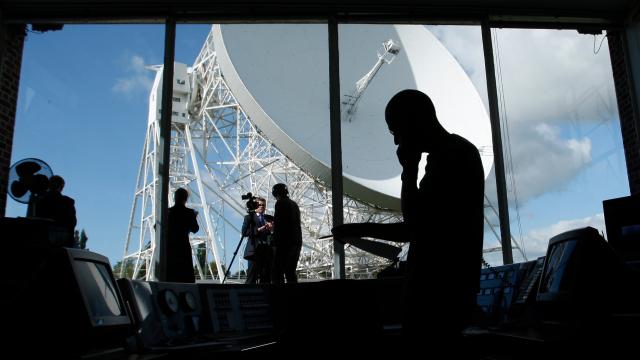The Jodrell Bank Observatory, part of the University of Manchester and home of the massive Lovell Telescope and numerous others, has received UNESCO World Heritage Site status, the BBC reported on Monday.
According to the BBC, the decision was made during a UN World Heritage Committee meeting in Azerbaijan and gives the site protected status under international treaties. The observatory will thus join other sites that have received UNESCO recognition, including the Iraqi city of Babylon, the Yellowstone National Park, the Great Barrier Reef, the Great Wall of China, Stonehenge, the Taj Mahal, and Macchu Picchu.
The Jodrell Bank Observatory was founded in 1945 by renowned physicist and radio astronomer Bernard Lovell. The telescope bearing his name, which is 76 metres in diameter and according to the Guardian weighs 3200 tonnes, was built in 1957 and once held the record for the world’s largest steerable radio telescope. (It now holds third place.)
Jodrell Bank was involved in tracking U.S. and Soviet spacecraft during the Cold War – Lovell was the only radio telescope capable of tracking Sputnik 1’s carrier rocket and is one of the most important research sites in the history of radio astronomy, which uses radio waves rather than visible light to gather data about the cosmos and has been massively consequential for science.
Visitors to Jodrell Bank can see telescopes and other instruments dating to every era of radio astronomy after 1945.
Per the BBC, Jodrell Bank “was on standby as the UK’s early warning system against any potential nuclear attack during the 1962 Cuban Missile Crisis,” tracked the Luna 9 spacecraft as it made the first soft landing on the lunar surface in 1966, and has been featured in “the BBC’s Stargazing Live series, Douglas Adams’ Hitchhiker’s Guide to the Galaxy and Doctor Who.”
It also is home to the headquarters of the Square Kilometre Array, an effort to build a massive radio telescope by linking thousands of sites across Africa and Australia.
Jodrell Bank has been awaiting World Heritage Site status since 2010, when an application was first filed to put it on the UK’s nomination shortlist, according to the BBC. One of the criteria it fulfilled was qualifying as “a masterpiece of human creative genius.”
So…. that’s it! We did it!@jodrellbank is now a UNESCO World Heritage Site….
Nearly 10 years after @ProfTimOB & I began the process, it was a privilege to hear the gavel come down on the decision. Huge thanks to everyone who helped us along the way. ???????????? pic.twitter.com/OHyOr1qehg— Prof Teresa Anderson (@_TeresaAnderson) July 7, 2019
UK heritage minister Rebecca Pow told the Guardian that the listing will “make sure that this remarkable site will continue to inspire young scientists and astronomers all over the world,” adding that “The research completed here has transformed our understanding of the universe and it is right that this is recognised.”
“This is wonderful news and a great day in the history of Jodrell Bank,” Jodrell Bank Discovery Centre director Teresa Anderson told the Guardian. “It honours the pioneering work of Sir Bernard Lovell and the early scientists here, together with the world-leading research that continues to this day. Receiving this recognition will help us tell their story and the story of the communities connected to the site both across the UK and worldwide.”
Other sites added to the list this time include eight buildings designed by Frank Lloyd Wright, Portugal’s Royal Building of Mafra and Sanctuary of Bom Jesus do Monte in Braga, Spain’s Risco Caido and the sacred mountains of Gran Canaria Cultural Landscape, the churches of Russia’s Pskov School of Architecture, and the historic center of the city of Sheki in Azerbaijan.
[BBC]
